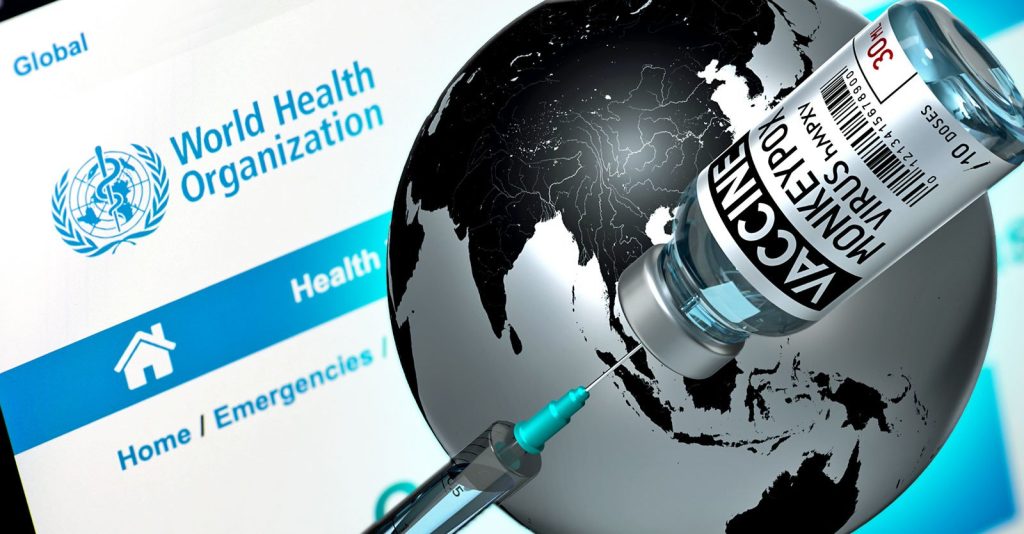
Please Follow us on Gab, Minds, Telegram, Rumble, GETTR, Truth Social, Twitter
by Brenda Baletti, Ph.D.
The World Health Organization (WHO) today triggered the process to grant Emergency Use Listing to two monkeypox vaccines.
WHO Director-General Tedros Adhanom Ghebreyesus told the media the listing will accelerate vaccine access in lower-income countries that have not yet approved the drugs.
“Emergency Use Listing also enables partners including Gavi and UNICEF to procure vaccines for distribution,” Tedros said. He also said he would convene an expert group to determine if the spread of monkeypox — renamed mpox — in Africa should be declared a global emergency.
Gavi, the Vaccine Alliance and UNICEF are funded in part by the Bill & Melinda Gates Foundation.
The WHO uses the Emergency Use Listing process to help member states that haven’t already authorized unlicensed vaccines, therapeutics and tests speed up their processes for authorizing them.
During the COVID-19 pandemic Emergency Use Listing was a key mechanism used by member states without structures for granting emergency use authorization to drugs to authorize and distribute the vaccines, working together with the WHO, Gavi and UNICEF, Unlimited Hangout’s Max Jones reported.
Tedros said the Emergency Use Listing helps those same partners procure vaccines for distribution, and that countries like Japan, the U.S. and the European Union are supporting the effort through donations.
He said the Democratic Republic of the Congo is experiencing a severe outbreak of mpox, with 14,000 cases and 511 deaths. Although cases have existed there for decades, the numbers are rising and spreading to new provinces, he said.
There have also been 50 confirmed cases reported in neighboring countries Burundi, Kenya, Rwanda and Uganda.
The illnesses, he said, are caused by a virus strain, or “clade,” — clade 1b — that is more severe than clade 2, which was responsible for the global outbreak in 2022.
In 2022, WHO declared mpox to be a global emergency after reporting that it spread to more than 70 countries, mostly affecting gay and bisexual men. At the time, Tedros made the declaration unilaterally, in direct contradiction to independent review panel advice.
Out of concern with the current spread of monkeypox, Tedros announced the WHO has developed a $15 million response plan for surveillance, preparedness and response activities. The agency has already released $1 million from the WHO Contingency Fund for Emergencies to support scale-up of the response, with plans to release more in the coming days.
He also said he is convening an Emergency Committee under the International Health Regulations to advise him on whether the outbreak is a “public health emergency of international concern.”
“The committee will meet as soon as possible and will be made up of independent experts from a range of relevant disciplines from around the world,” Tedros said.
Safety and efficacy concerns with the vaccine
Symptoms of monkeypox infection are usually mild and include fever, rash and swollen lymph nodes, and occasionally intense headache, back pain, muscle aches, lack of energy and skin eruptions that can cause painful lesions, scabs or crusts.
The virus is “rarely fatal” and no deaths were reported in the U.S. as of Aug. 4, 2022.
Dr. Meryl Nass, an internist and biological warfare expert, told The Defender that in Africa, the disease has reportedly been more deadly. The numbers, she said, are difficult to confirm.
Tedros did not name the vaccines that will receive Emergency Use Listing, but Nass said there are two monkeypox vaccines: Jynneos and ACAM2000.
Both were originally approved to fight smallpox. Jynneos was licensed for monkeypox in the U.S. in 2019 — when no outbreak was ongoing. ACAM2000 has been “made available for use against mpox in the current outbreak [2022] under an Expanded Access Investigational New Drug (EA-IND) protocol.”
The drugs cause myocarditis, pericarditis and other serious side effects at high rates, Nass said, as the labels for both drugs indicate.
Neither of the vaccines are approved for children under age 18, although in 2022, Jynneos received emergency use authorization in the U.S. for children under 18 considered to be at high risk.
Officials at the Africa Centers for Disease Control and Prevention (CDC) reported the majority of cases and deaths from monkeypox are in children under age 15.
Nass said that although in the U.S. monkeypox has appeared to be a mild illness, several lucrative government contracts have paid the vaccine makers hundreds of millions to stockpile the vaccines.
Nass also said there are serious questions about the efficacy of the vaccines. According to the labels, the efficacy rates are inferred based on immunogenicity studies, which study antibody responses, rather than testing whether a vaccine protects against disease.
The U.S. CDC said the vaccines are “expected to be effective” against both clades of monkeypox infection.
The Poxvirus and Rabies Branch of the Africa CDC, which has done much of the monkeypox vaccine safety and efficacy research in the Democratic Republic of Congo, did not immediately respond to questions about the efficacy and safety of the vaccines.
Brenda Baletti, Ph.D., is a senior reporter for The Defender. She wrote and taught about capitalism and politics for 10 years in the writing program at Duke University. She holds a Ph.D. in human geography from the University of North Carolina at Chapel Hill and a master's from the University of Texas at Austin.
“© [Article Date] Children’s Health Defense, Inc. This work is reproduced and distributed with the permission of Children’s Health Defense, Inc. Want to learn more from Children’s Health Defense? Sign up for free news and updates from Robert F. Kennedy, Jr. and the Children’s Health Defense. Your donation will help to support us in our efforts.
Subscribe to our evening newsletter to stay informed during these challenging times!!